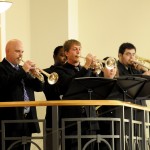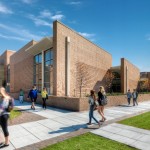Philosophy
Trombone/euphonium studies at ODU are designed to develop in the player the highest possible level of musicianship and proficiency in performance and/or teaching depending on the curriculum of study chosen.
The curriculum is designed to present a logical and relevant sequence of study throughout each degree program. Musical performance skills and concepts of education will be acquired through the following:
a. The development of technical facility to meet the needs of artistic expression. Mastery of this facility enables the player to perform with the optimum level of musical artistry and expression through total freedom and control of technique and with understanding and sensitivity to the concepts of expression and phrasing. All students will complete a systematic course of technical development as part of weekly practice measured in lessons. This course is designed to develop skills in the areas of tone production, flexibility, tonguing, and manipulation of key areas through application of scales and arpeggios.
b. Performance of a cross-section of literature in all styles and areas.
c. The development of the ability to read at sight.
d. Experience in solo and ensemble performance.
e. Regular participation in studio class, student recitals and guest artist performances and clinics.
f. The acquisition of relevant study and professional materials such as printed music, recordings, and any materials which broaden one’s cultural base.
g. An understanding of teaching procedure and practice, rehearsal and conducting techniques. Observation of working procedure in the private studio, master classes and ensemble rehearsals are relevant to this goal.
The student’s scholarly and applied preparation and performance of materials while enrolled in trombone/euphonium studies should:
a. Show a clear understanding of the selected music with regards to musical style and form, including the ability to discuss the historical placement of the piece, its tonality framework and/or compositional techniques. Performance should be stylistically correct with regard to historical period.
b. Reflect progressive understanding of tone production and technical development. This should include concepts of rhythmic understanding, dynamic observance and control, articulation and phrasing, pitch accuracy, technical velocity and finesse.
c. Be meaningful considering the student’s artistic talents and level of achievement.
In addition the student is expected to develop the ability to assume organizational procedure, such as correct set-up and care of instruments, capacity to prepare music by set deadlines, and a sense of responsibility to meet all rehearsals, performances and commitments on time and observe School of Music Policies. The student is expected to possess, or else quickly cultivate, an attitude toward trombone/euphonium study that is as musical and sophisticated as that expected from any other music student.
At the completion of a degree program the student will be capable of giving a recital (a half or full recital depending on the degree) which could include composers from the Renaissance to the present. The graduate will be capable of playing an honorable audition for an orchestra, combo, studio job or teaching position. Pedagogically, the graduate will also have attained an awareness of the historical evolution and development of the instrument, its playing, construction, acoustical properties, literature and pedagogy.


